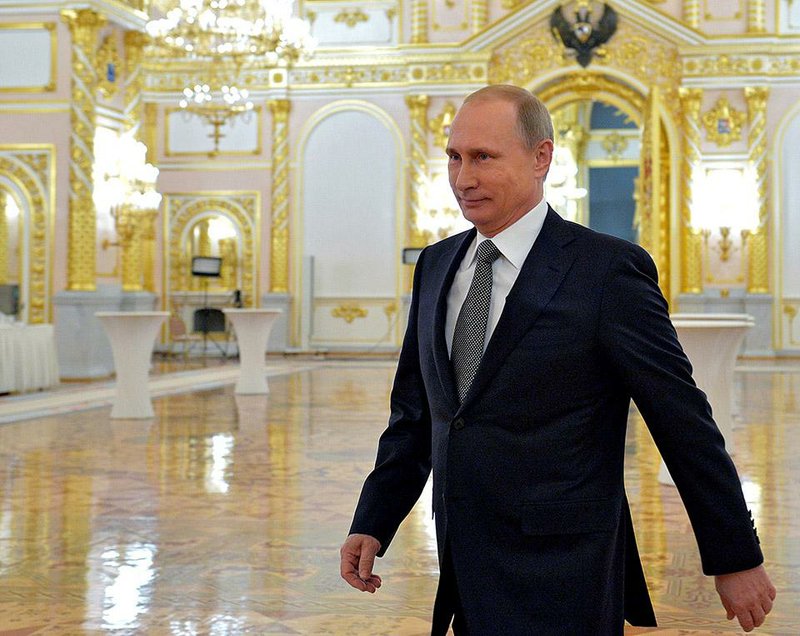MOSCOW -- President Vladimir Putin attacked the United States and Europe on Thursday for backing Ukraine and said Crimea, which the Kremlin annexed from the former Soviet republic in March, has "sacred meaning" as Russia's "Jerusalem."
As Ukrainian officials made plans to pause shelling Tuesday, Putin said he isn't surprised by the country's separatist conflict, given what he termed "the coup and violent takeover of power" in Kiev in February.
Pro-Russia President Viktor Yanukovych was ousted in February after months of street protests, which began in November after he broke a promise to sign agreements strengthening political and trade ties with Europe.
Putin said Thursday in his annual address to parliament and other top officials in Moscow that the U.S. and European Union, which have imposed sanctions that are hobbling Russia's economy over its stance on Ukraine, would have penalized his country even if the conflict hadn't broken out.
The U.S. and the European Union blame Putin for stoking the conflict between Ukrainian forces and eastern pro-Russia separatists that has killed more than 4,300 people and displaced 500,000 this year. His government denies any involvement in Ukraine.
Crimea has "invaluable civilizational and even sacred meaning for Russia, like the Temple Mount in Jerusalem for the followers of Islam and Judaism," Putin said. "And this is how we will always consider it."
He likened his global opponents to Adolf Hitler.
Hitler, "with his humanity-hating ideas, was going to destroy Russia and throw us back behind the Urals," Putin said. "Everyone should remember how that ended." The Nazi leader committed suicide in his Berlin bunker as the city was captured by the Red Army in 1945.
Putin brushed off the Western sanctions, which have limited access to capital markets for some Russian banks and companies and blacklisted officials involved in the conflict, saying they were aimed at keeping Russia down.
"They are not just a knee-jerk reaction on behalf of the United States or its allies to our position regarding the events and the coup in Ukraine, or even the so-called Crimean Spring," Putin said. "If none of that had ever happened, they would have come up with some other excuse to try to contain Russia's growing capabilities."
Russia is also being hit by oil prices that have dropped by more than 35 percent since June. Russia depends on oil and gas revenue for about half of its federal budget. The ruble has lost about a third of its value since Putin started his incursion into Crimea.
U.S. Secretary of State John Kerry said Russia is forcing its own citizens to pay "a steep economic and human price including the price of hundreds of Russian soldiers who fight and die in a country where they had and have no right to be."
"Regrettably, Russia continues to supply new weapons and increase support for armed separatists," Kerry said Thursday at a meeting of foreign ministers of the Organization for Security and Cooperation in Europe states in Basel, Switzerland. "In doing so it fails to meet its international and OSCE obligations and to live up to an agreement that it has negotiated and signed."
In Basel, Kerry and Russian Foreign Minister Sergei Lavrov discussed efforts to negotiate a cease-fire in eastern Ukraine. Kerry also urged a return to talks about the implementation of a Sept. 5 truce signed in Minsk, Belarus, a State Department official said in an emailed statement. The truce has been broken almost daily.
Ukrainian President Petro Poroshenko said his side is sticking to the Minsk agreement, and, in line with the pact, would stop firing and begin a "day of silence" starting Tuesday, according to a statement on his website. A rebel leader in Luhansk said the two sides had agreed verbally to a truce but no deal had yet been signed, news service RIA said.
Oleksandr Rozmaznin of the Ukrainian armed forces command center, citing an intercepted report, said there were 32,000 Russian servicemen and mercenaries fighting Ukrainian forces, including as many as 10,000 Russian troops, Interfax reported.
One Ukrainian soldier had been killed and 13 wounded in 71 separate attacks since Wednesday, National Security and Defense Council spokesman Andriy Lysenko said Thursday.
Information for this article was contributed by Ian Wishart, Henry Meyer, Stepan Kravchenko and Kateryna Choursina of Bloomberg News and by staff members of The New York Times.
A Section on 12/05/2014
